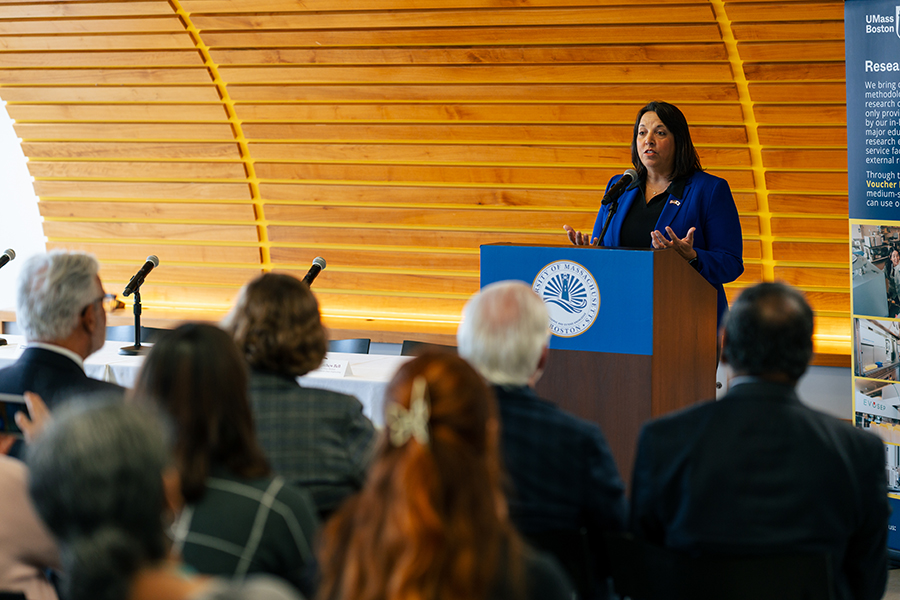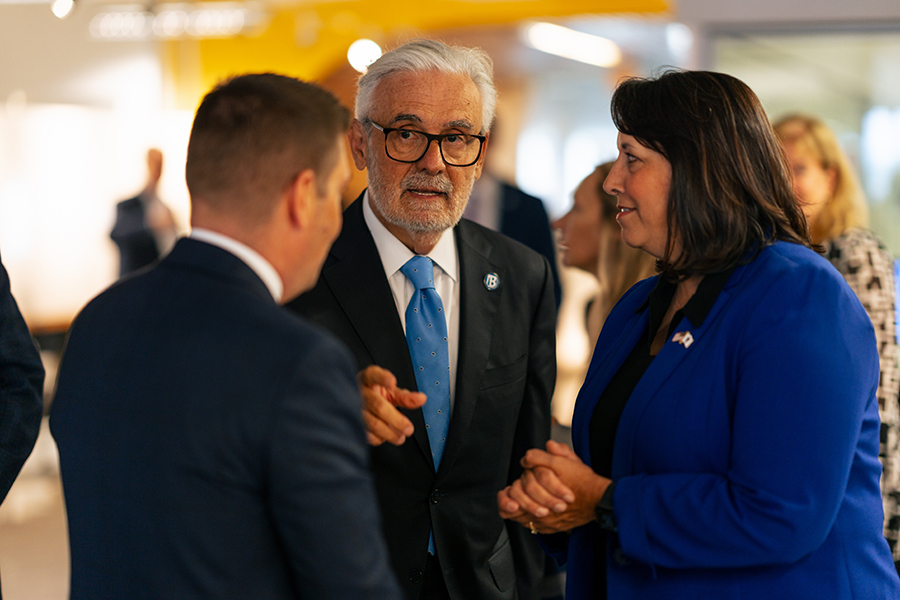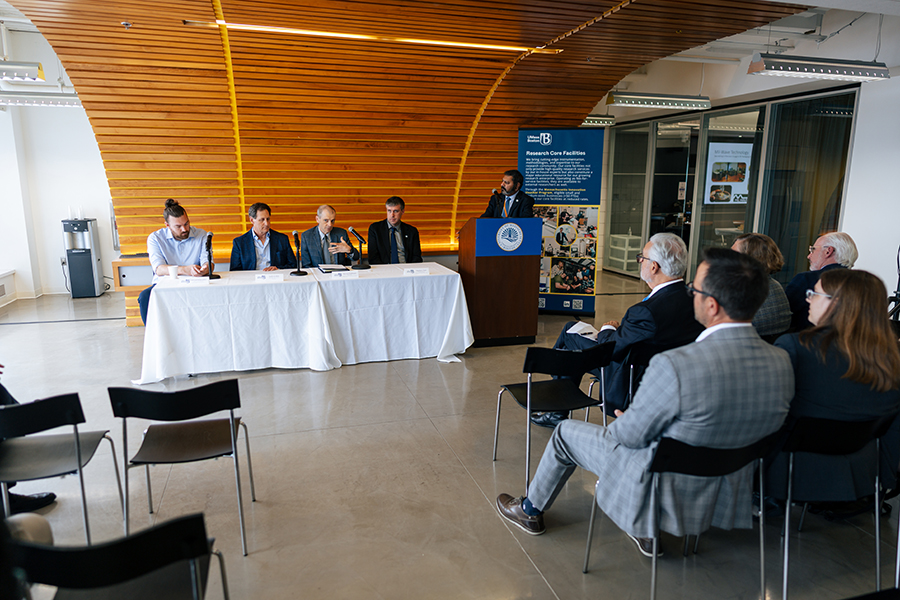- Home
- News
- Recent News
- UMass Boston Secures $3.8M for Collaborative Expanding Quantum
UMass Boston Secures $3.8M for Collaborative Expanding Quantum Hardware Development, Commercialization
MassTech Builds on its Support of UMass Boston, Western New England University-led Initiative

The Massachusetts Technology Collaborative (MassTech), alongside the Massachusetts Executive Office of Economic Development, has awarded UMass Boston a $3.8 million grant to build upon the state’s leadership in the “Second Quantum Revolution.” The new funding will support emerging technologies such as quantum computing, sensing, communication, and cryptography, all of which are poised to transform industries ranging from cybersecurity and finance to pharmaceuticals and materials science.
“As we stand at the threshold of the next quantum leap for Massachusetts, this bold collaboration lights the way to a future fueled by discovery, inclusion, and shared prosperity. With vision, clear purpose, and in partnership with Western New England University, we are forging an innovation ecosystem that will empower our students, strengthen our economy, and shape the technologies that will define tomorrow,” said UMass Boston Chancellor Marcelo Suárez-Orozco. “We are forever grateful to the Healey-Driscoll Administration for this funding, propelling us toward the 2.0 phase of this essential collaboration.”
The new grant builds on an initial $1 million investment from MassTech in 2022 that launched a partnership between the UMass Boston and Western New England University in Springfield, Mass. That funding helped establish a statewide network of quantum research centers to accelerate quantum hardware development and commercialization.
“Innovation and research are foundational to the Massachusetts economy,” said Governor Maura Healey. “While the federal government is turning their backs on research and development, Massachusetts is leaning in to support our knowledge-based economy. We are proud to deliver this funding to UMass Boston to expand their work with quantum computing to drive innovation and discovery."
Massachusetts has long been home to world-class talent that powered the digital age. Today, both small and large businesses are harnessing that expertise to develop and commercialize next-generation quantum technologies. The 2022 investment focused on building critical infrastructure for small businesses, providing access to advanced cryogenic testbeds and specialized measurement hardware. This included the acquisition of state-of-the-art dilution refrigerators and the creation of UMass Boston and Western New England University’s quantum core measurement facility, which now serves as a hub for quantum product validation and commercialization.
“We have worked tirelessly at the University of Massachusetts to build our research enterprise into something that strengthens the university and drives the state’s economy,” UMass President Marty Meehan said. “This important collaboration will further develop emerging technologies in quantum computing that will revolutionize many industries, and we are grateful to the Healey-Driscoll Administration for their continued commitment to invest in valuable research at the university. Research conducted by higher education institutions is the cornerstone of innovation, leading to commercialization, startups, and economic growth in the Commonwealth.”
By leveraging state investment into infrastructure and the establishment of a quantum collaborative network, UMass Boston was able to secure $5 million in federal funding to continue to build out quantum research and a Data and Quantum Science (DataQS) Center at UMass Boston.

“The initial funding demonstrated that a collaborative model works,” said Lt. Governor Kim Driscoll. “By partnering with institutions of higher education, we can work toward meeting the demand from Massachusetts-based small businesses working on high-impact projects, expanding capital resources and core capabilities.”
The project also launches the Quantum Jumpstart seed grant program, designed to accelerate product development and validation. By leveraging seed funding alongside the expertise of the collaborative network and the UMass system’s core facilities including the Quantum Core Facility at UMass Boston grantees will gain a powerful platform to bring new technologies to market.
“This next phase will deliver cutting-edge testing and measurement infrastructure at UMass Boston and Western New England University, developed in close collaboration with industry partners,” said Professor Matthew Bell, chair of the Engineering Department at UMass Boston. “A new quantum hardware packaging and assembly facility is also being established in Hatfield, Mass., creating vital capacity for scaling lab-to-fab technologies.”
A central pillar of the initiative is quantum workforce development. By connecting local industry with university researchers and students, the program will help train the next generation of quantum-aware engineers and technicians. These efforts will not only support industry demand for skilled scientists and engineers but will also provide new upskilling pathways for industry professionals.
“This investment strengthens Massachusetts’ position at the forefront of quantum innovation. By connecting our universities with industry partners, we are accelerating the move from breakthrough research to real-world applications, while building the talent and infrastructure that will anchor the state as a global hub in this transformative field,” said Massachusetts Economic Development Secretary Eric Paley.
The quantum computing market, valued at $866 million in 2023, is projected to reach $4 billion by 2028. Market leaders, including IBM, Google, Amazon, Honeywell, Microsoft, and Intel, are investing heavily in this field, especially in hardware, which makes up 82% of the current market. However, scaling quantum hardware remains a grand challenge. A major bottleneck is the limited hardware development capacity and skills gap, where overburdened PhDs and engineers must perform support tasks better suited for quantum-literate engineers and technicians.
“MassTech has continued to support innovative projects to expand quantum computing in Massachusetts because we anticipate enormous growth potential in this sector,” said MassTech CEO Carolyn Kirk. “This investment in UMass Boston will help build on the progress we've made to build a talent pipeline, support quantum research and development, and quicken the pace toward commercialization.”

Today’s announcement was made at UMass Boston’s Venture Development Center and followed by a roundtable discussion among academic, industry, and government leaders.
About the Innovation Institute at the Massachusetts Technology Collaborative
The MassTech Collaborative is a quasi-public economic development agency that strengthens the competitiveness of the tech and innovation economy by driving strategic investments, partnerships, and insights that harness the talent of Massachusetts. The Innovation Institute is the division of MassTech that advances its core mission of innovation and cluster growth across the Commonwealth. Created in 2003, the Innovation Institute intervenes in the economy in the following four ways:
- Conducts research and analysis that improves the state’s understandings of unmet needs and opportunities in the innovation economy;
- Serves as convener and key strategic broker on the landscape;
- Manages high-value projects on behalf of the Commonwealth; and
- Makes strategic investments in support of innovation-based economic development.
For more information, visit https://innovation.masstech.org/.
About UMass Boston
The University of Massachusetts Boston is deeply rooted in the city's history, yet poised to address the challenges of the future. Recognized for innovative research, metropolitan Boston’s public university offers its diverse student population both an intimate learning environment and the rich experience of a great American city. UMass Boston’s colleges and graduate schools serve 16,000 students while engaging local and global constituents through academic programs, research centers, and public service. To learn more, visit www.umb.edu.